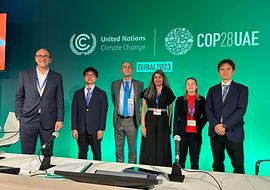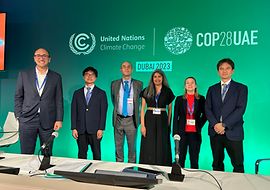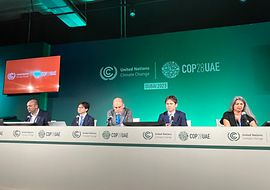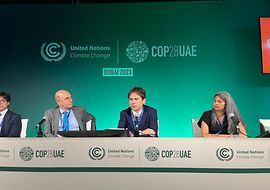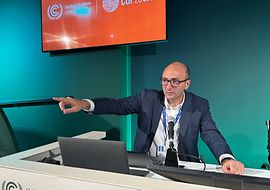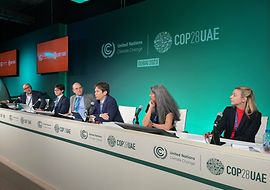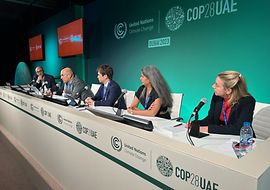Global Hydrogen Market: “Harmonization is key”
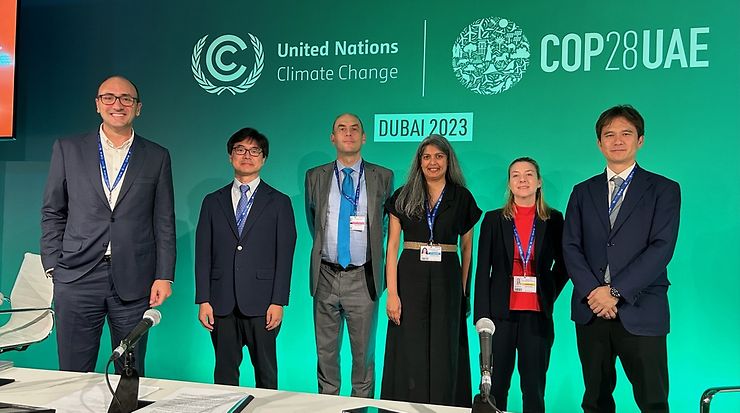
© DIN
Due to the increasing concentration of greenhouse gas emissions despite the growth and deployment of renewable energy sources in electricity generation, hydrogen holds promise to significantly reduce carbon emissions in hard-to-abate sectors, including long-haul transport, steel and iron, cement, and chemicals. Hydrogen combusts and releases energy without making carbon dioxide, making it an emissions-free source of energy. This can help to strengthen national energy security and diversify transportation energy options towards a more resilient and low carbon system. However, without clear standards and systems for conformity assessment, the promise of clean hydrogen may erode.
International standards for the measurement, reporting and verification of the carbon footprint of hydrogen products are essential towards more comparability enabling its acceleration and global deployment. The International Accreditation Forum (IAF), Deutsches Institut für Normung (DIN) and Japan Gas Association organized a related COP28 side event held on 12 December, “Global Clean Hydrogen Market – Harmonization of Measuring, Reporting, Verification and Accreditation”. Moderated by Javier Garcia, Director General of the Spanish Association for Standardization and ISO Vice President, the panel discussed the important interplay between industry, standards setters, accreditation bodies, conformity assessment bodies, and regulators that is required to build a clean, green hydrogen market worldwide.
Mr. Garcia opened the discussion with some recent news regarding the release of a new technical specification from ISO (ISO/TS 19870) as a foundation for harmonization, safety, interoperability, and sustainability across the hydrogen value chain. In addition, ISO has signed an agreement with UNIDO to deepen commitment to decarbonization and the development of standards for renewable and low carbon hydrogen.
Mitsuhiro Kohara, Japan Gas Association, explained the need for massive amounts of hydrogen as Japan shifts much of its energy resources from natural gas to the synthetic fuel e-methane: "We will be big consumers of hydrogen in the future, so develop the standard ISO DIS 6338, establish market with a sense of unity, establishing the value of recycled carbon fuels such as e-methane for net-zero society using hydrogen.”
David Bublil of the EU Commission confirmed that the EU is committed to accelerating the introduction of hydrogen. "At the same time, hydrogen must have the smallest possible CO2 footprint. Therefore, we need standards and reliable accreditation on how emissions are calculated and reported - in line with the Carbon Border Adjustment Mechanism.”
Wataru Takahama of Japan's Ministry of Economy, Trade and Industry pointed out that the objective is to create the market. “While we have a common goal, we should strike a balance between necessary emission reductions and economic growth." Mr. Takahama also stressed the importance of avoidance of duplicate verification costs for industry to help the market grow.
Smeeta Fokeer of UNIDO, the United Nations Industrial Development Organization, highlighted the opportunities for achieving "net zero" in the global south. "The hydrogen market can create jobs, economic resilience and a green, diversified economy. For this, we need capacity building and knowledge, and developing countries need to be involved.”
The opportunity was underlined by Gabriel Lassery Rocha Da Silva of the Brazilian Hydrogen Association: "Brazil has great potential for hydrogen production. A well-functioning market will benefit the whole region in South America.”
Ann Howard of IAF cited the varying definitions of types of hydrogen as well as varying national and jurisdictional hydrogen policies and expected accredited verifications as being amongst the challenges faced in the harmonization of hydrogen standards and accreditation. She noted that there had been some progress at COP 28 with the COP28 Declaration of intent of the Mutual Recognition of Certification Schemes for Renewable and Low-Carbon Hydrogen and Hydrogen Derivatives which seeks to work toward mutual recognition of hydrogen certification schemes to help facilitate a global market. However, there is a clear need for greater international coordination, information sharing, and the development of a harmonized quality infrastructure among standardization and accreditation bodies to support the green hydrogen market.
Here's a recording of the session:


